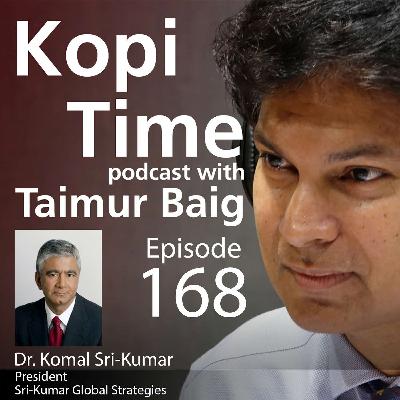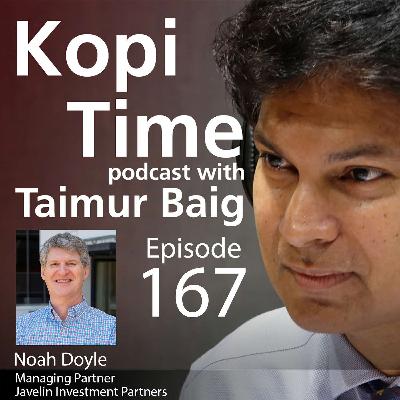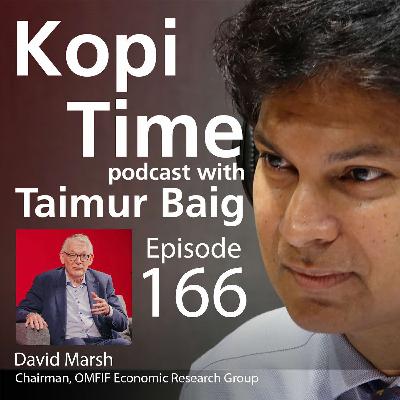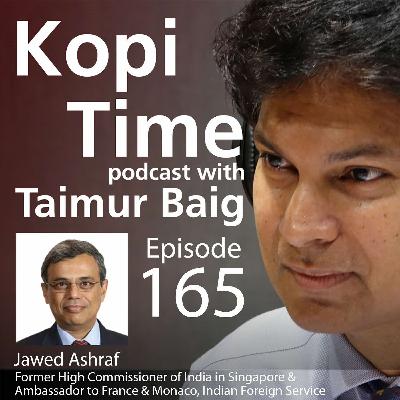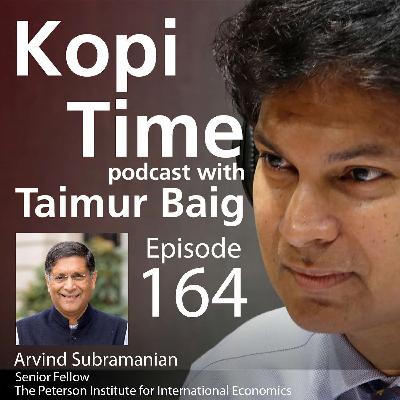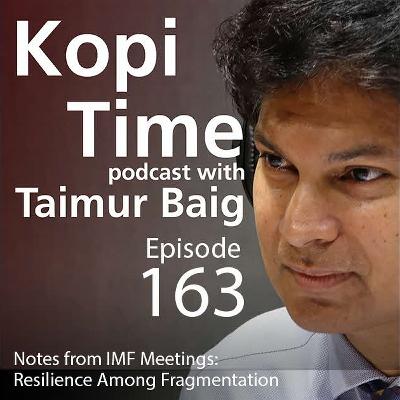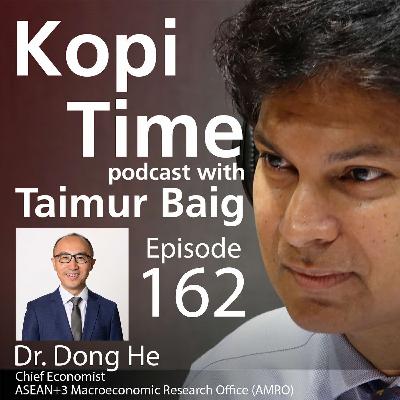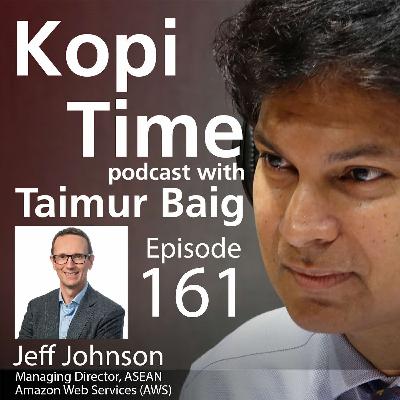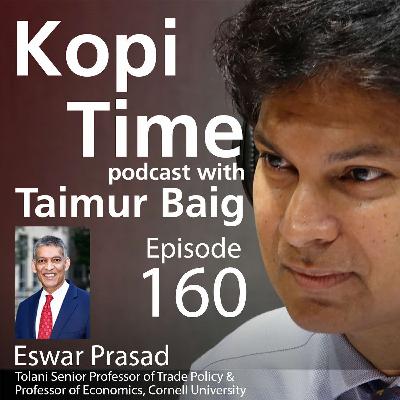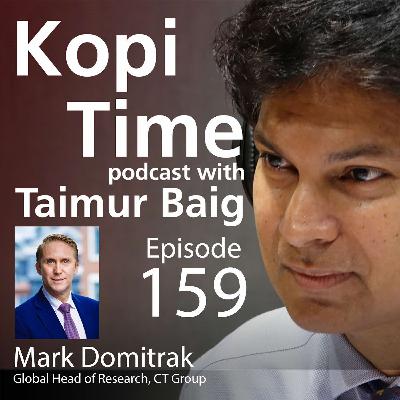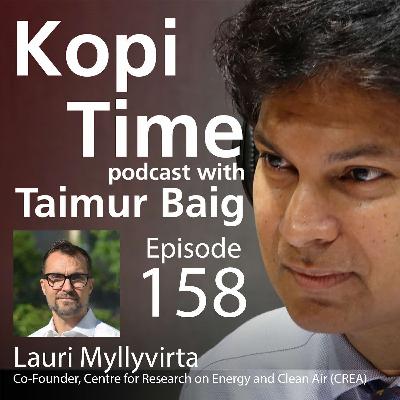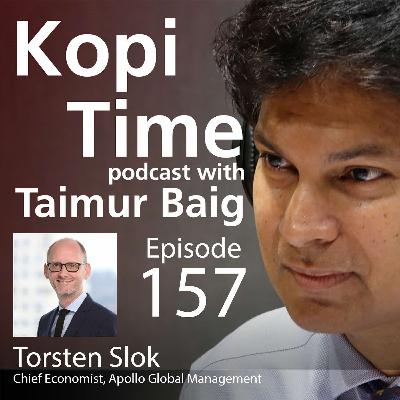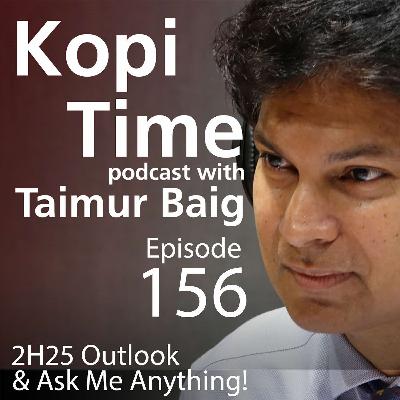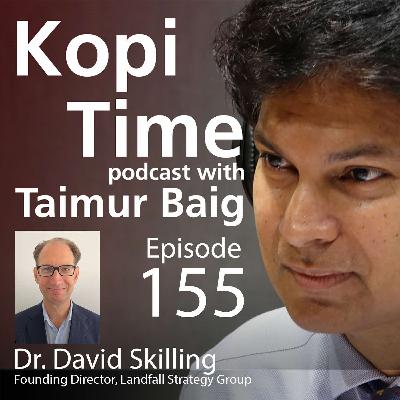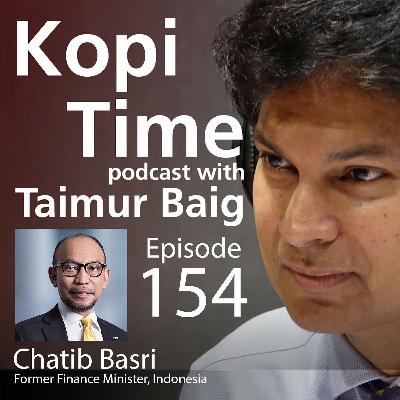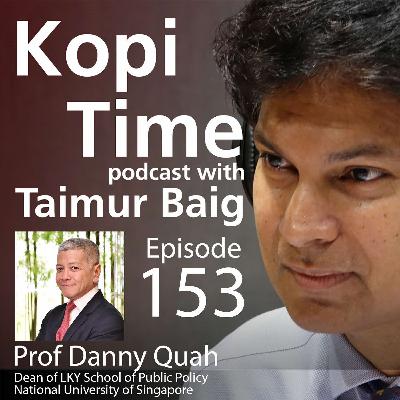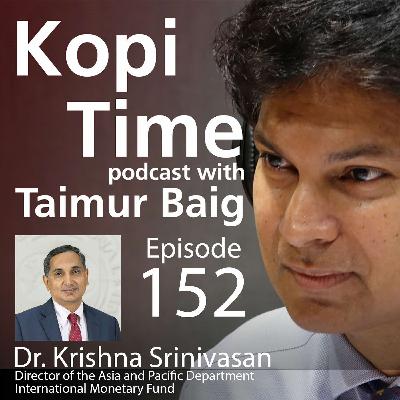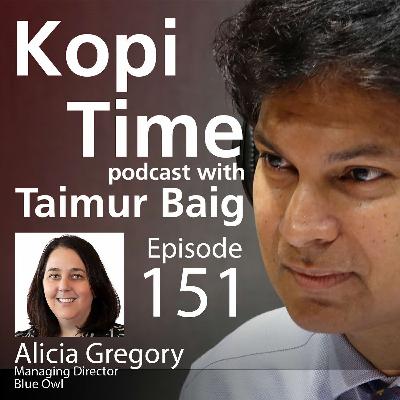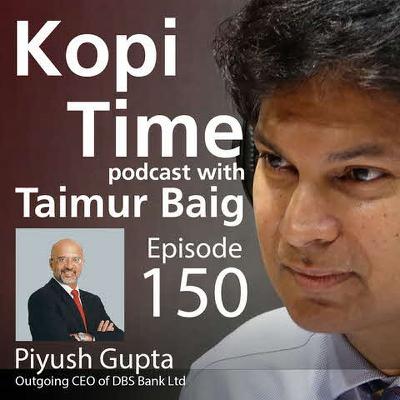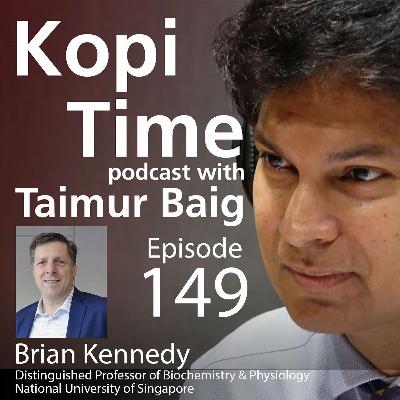Discover Kopi Time podcast with Taimur Baig
Kopi Time podcast with Taimur Baig

170 Episodes
Reverse
Fiscal slippage, lower economic growth, sticky inflation, weaker dollar, steeper yield curve, financial instability; these are the key prognostications of Dr. Komal Sri-Kumar in our year-end podcast. President of Sri-Kumar Global Strategies, Sri is a deep thinker on macro trade strategies, and his forecasting track record is outstanding. Going into 2026, he is bearish both stocks and bonds, long vols and gold, and bearish the USD. He worries that the inevitable bursting of the AI-bubble and sticky inflation would cause stagflation and financial instability risks in the US next year. He is also concerned about the erosion of institutional strength in the US, from the central bank to the treasury to the statistical agencies. An unambiguously bleak outlook.See omnystudio.com/listener for privacy information.
Noah Doyle, Managing Partner at Javelin Investment Partners in Silicon Valley, with decades-long background in venture capital, joins Kopi Time to talk about tech and AI. We begin with a general discussion on the present vibe in Silicon Valley, giddy with record investments and returns. We then immediately pivot to the question of the moment, if there is an AI bubble, to which Noah offers a detailed and nuanced response, walking us through the supply and demand for AI infrastructure and products, the fund raising and capital deployment ecosystem, and dizzying valuation of AI companies, public and private. I then nudge Noah toward an issue close to his heart--if the path toward AGI through Gen AI, and if not, are there alternative paths in the making. Noah responds by discussing alternatives to Large Language Models, including symbolic logic-based AIs. We take the conversation toward innovations coming out of China and the US, which Noah tracks closely and sees the trend as a positive, mutually beneficial development. We talk about regulatory guardrails, cyber security, privacy, and ethical aspects of AI to round-up this fascinating conversation.See omnystudio.com/listener for privacy information.
David Marsh, Chairman of OMFIF economic research group, returns to Kopi Time to talk about the UK and Europe, with his new book, “Can Europe Survive?” (Yale University Press, link here), anchoring the conversation. We begin with the current economic, political, and security-related challenges, including US tariffs, China’s industrial prowess, conflict with Russia, immigration, energy security, and the rise of the far right. David delves into his decades of experience on geoeconomics to parse through the difficulties faced by the region’s leaders. He sees an urgent need for liberalisation of capital markets, greater trade and financial linkages with Asia, and sustained efforts to bring the region closer, while at the same time respecting some of the centrifugal forces at play. Europe, according to David, faces its gravest test since the second world war; a fundamental renewal of the EU compact and international partnerships is warranted at this critical juncture. See omnystudio.com/listener for privacy information.
Jawed Ashraf, with over three decades in Indian foreign service, including Ambassador to France and High Commissioner to Singapore, offers his insights on India’s foreign policy here and now. We begin with the India-Europe relationship on trade, investment, tech, talent, travel, and visas, which leads to the challenges related to Russia. The conversation then moves to India’s ongoing challenges vis-à-vis the US, China, and Pakistan. We conclude with going over the vast potential for deeper India-South East Asia collaboration. In each of these cases, the recently retired foreign service veteran digs into his vast experience and deep expertise.See omnystudio.com/listener for privacy information.
We welcome back Arvind Subramanian, Senior Fellow at the Peterson Institute for International Economics, to Kopi Time. We focus on some recent work by Arvind and Shoumitro Chatterjee (see article here), in which they argue that China’s continued dominance in low-skill export sectors reflects not just efficiency, but deliberate policy choices that prevent poorer countries from climbing the development ladder. We talk about their findings, nuances to the conclusions, implication for trade and exchange rate policy, geopolitical considerations, and delve into a few issues beyond the article, including China’s rapid climb up the technology value-addition ladder. We also touch in Arvind’s new book, A Sixth Of Humanity: Independent India's Development Odyssey, co-authored with Devesh Kapur.See omnystudio.com/listener for privacy information.
In this episode, I deliberate over the recently concluded IMF-World Bank annual meetings. The IMF Meetings in Washington DC featured some recognition of global resiliency amid geoeconomic fragmentation. Concerns about numerous risks at play have not faded though. Governments and firms are dealing with erratic policy making by the US. Trade, commerce, and tech adoption go on in spite of the persisting uncertainty. The IMF sees mild upside to growth risks in the near term. The US economy, buffeted by strong consumption and investment, is on 2% growth trajectory. For the rest of the world, stress lingers, but response is better than expected. See omnystudio.com/listener for privacy information.
Dr. Dong He, Chief Economist of ASEAN+3 Macroeconomic Research Office (AMRO), joins Kopi Time to discuss the regional outlook. Dong weighs in on the impact of high US tariffs on the regional economy, the growth outlook, space for fiscal and monetary support, implication of the weak dollar environment, financial stability issues, green transition, and the disruptive role of AI. Through these sweeping discussions, Dong taps into his deep financial sector expertise. He also touches on the massive role China is playing in regional capital flows, investment, and tech developments.See omnystudio.com/listener for privacy information.
Jeff Johnson, MD and General Manager for Asean at AWS, joins Kopi Time to talk about all things cloud. We begin with AWS’s reach and scale, spectrum of services, and regional engagement. Jeff provides a host of examples to underscore enterprise usage with disruptive technologies, both AI and GenAI. He also sets the ground with the foundational tech stack maintained and continuously ungraded by AWS. We discuss security, reliability, sustainability, and democratisation of AI; Jeff contextualises these aspects with his deep experience in dealing with businesses in the region. We end with two big questions; will AI eat jobs and will AI show up in company bottom line sooner than later. Fascinating observations from one of the industry leaders.See omnystudio.com/listener for privacy information.
We go deep into stablecoins, the idea and practice of which have been around for a while, but a few things have happened this summer to make the matter catch major momentum. To parse through these developments (especially the US GENIUS Act), outlook, and risks, we welcome back Eswar Prasad, the Tolani Senior Professor of Trade Policy and Professor of Economics at Cornell University. We touch on the stablecoin tech stack, legislations being passed around the world, international dimensions, use case, regulatory risks, and potential disruptions to central banking and traditional finance. Eswar wrote an excellent piece on the Financial Times recently on this topic. Kopi Time extends those thoughts. See omnystudio.com/listener for privacy information.
Mark Domitrak, CT Group’s head of research, spends his time figuring out the pulse of consumers and corporate boardrooms. In this wide ranging podcast, he explains how his team makes polls informative and useful at a time when people are anxious and not as responsive to traditional approaches. He then offers insights into consumer and business sentiment on issues ranging from cost of living to trade war, China-US relationship to forces of fragmentation. We discuss the ongoing evolution in company strategies, and how they vary across regions. These strategies involve upholding core values while being pragmatic and realistic. Whether it is climate change, trade war, future of jobs amid tech disruption, or managing China, there is a lot to consider in assessing the outlook. Mark’s insights are clarifying in this context. See omnystudio.com/listener for privacy information.
Having been an avid consumer of the output of Centre for Research on Energy and Clean Air (CREA) for a few years, I have been keen to have its co-founder, Lauri Myllyvirta, on Kopi Time. Lauri delivers a tour de force here, going over the state of green transition in the US, Europe, China, and other emerging markets while taking into account geopolitics and regulation. We discuss wind, solar, nuclear, and hyrdo generation, while putting coal and gas into context. We also go over climate tech, touching on promising technologies. Lauri ends the discussion by explaining India and Indonesia’s climate change journey. Regardless of sometime conflicting signals from policy makers, climate finance and tech, green innovation and adoption, will go ahead; dedicated analysts like Lauri are on the right side of history. See omnystudio.com/listener for privacy information.
We connect with New York-based Torsten Slok, Chief Economist of Apollo Global Management, to discuss the US economy. This highly compelling discussion touches on the path of likely slowing of the US economy, outlook of inflation and jobs, labour productivity, impact of AI on jobs, Fed independence, likelihood of financial repression, fiscal dominance, bond market liquidity, investor sentiment, and stable coin. In all of these topics, Torsten has sharp insights; a must listen.See omnystudio.com/listener for privacy information.
For this podcast, it’s just yours truly. With 2H25 in mind, I go over trade wars, Middle East tension, and the US economy. Then I take a bunch of questions from clients and colleagues. We go over asset allocation, US debt outlook, attractiveness of Asian sovereign bonds, and a few non-market questions. Enjoy!See omnystudio.com/listener for privacy information.
We dive into the presently shifting capital flow dynamic with David Skilling, Founding Director, Landfall Strategy Group. David’s firm provides insights on global economic, geopolitical, and policy developments to firms, investors, and governments, so we begin by getting a sense of the mood of his clients. We then discuss if the ongoing geoeconomic instability is creating room for Europe and Asia to come closer, even with the China-US complications in place. We then delve into his recent publication, Capital Wars, in which he argues that efforts to rebalance global trade flows will contribute to structural change in global capital flows. We go region by region, from the US to Europe, UK to Japan, and then ending with South-East Asia, to take stock of the likely impact of greater competition for capital at the firm and national levels.See omnystudio.com/listener for privacy information.
This is a recording from the DBS Asia Insights Conference 2025, held in Jakarta on May 21. I had the privilege of discussing Indonesia’s near and medium term outlook with Chatib Basri, former finance minister. In this conversation, Mr. Basri talks about Indonesia’s strategy during a time of geoeconomic fragmentation, the ability of the economy to absorb shocks, what it would take to reach 8% growth, the challenges to education, health, and infrastructure, sectoral development strategies in place, and the future of jobs amid tech disruption. An erudite speaker, Mr. Basri’s insights are invaluable to those following South East Asia’s most populous economy.See omnystudio.com/listener for privacy information.
Prof Danny Quah, Dean of LKY School of Public Policy at the National University of Singapore, returns to Kopi Time to share his insights on the dangers and opportunities stemming from the changing world order. We go over two of his recent pieces; first, an open letter to the US president (penned before the US elections last November, and second, a research paper on the correlation between global trade and geopolitics. Prof Quah dissects the great power rivalry through (i) the perception of win-win versus zero sum and (ii) a tendency to attribute domestic welfare shortfalls (blue collar jobs, health, education, safety) to external factors (trade, immigration, defence spending). He then points out that trade liberalisation and the politics of global engagement have gone hand in hand on the way up (say, from the 1960s to 2010) and down (the past decade and a half). We then discuss a key point—the US shying away from globalisation or green transition does not doom those dynamics. There is a huge world of trade and GDP outside the US. The world is not being swayed; rules and agreements among the rest are proceeding, with the window left open for the US to return one day. See omnystudio.com/listener for privacy information.
Dr. Krishna Srinivasan, IMF’s Director of the Asia and Pacific Department, takes us on a journey of Asia, which is facing a major challenge to its export-led growth model. With geoeconomic fragmentation intensifying, how do nations strike a balance between trade promotion and domestic demand support? From China to India, South Korea to Vietnam, what is the outlook for growth, interest rate, and exchange rate, and what are the IMF’s fiscal, monetary, and structural policy prescriptions? What are the risk scenarios, given the heightened levels of uncertainty? What about the usage of the US dollar and financial stability risks? Krishna offers valuable insights on these questions.See omnystudio.com/listener for privacy information.
Alicia Gregory, Managing Director at Blue Owl, an alternative asset manager, joins Kopi Time to walk us through private equity, a USD12trln asset class. Drawing on her extensive experience as a PE investor, Alicia begins by going over the genesis of the industry. We then go through a number of topics, including the structure of private equity investments, key investment strategies, PE’s track record relative to public equity markets, and the state of the PE cycle and the outlook for 2025. We also cover the PE secondary market, connection between private debt and private equity, PE’s foray into retail, and possible risks in PE investment. A deep dive indeed.See omnystudio.com/listener for privacy information.
Kopi Time hits 5 years and 150 episodes! We celebrate the milestone with Piyush Gupta, outgoing CEO of DBS Bank Ltd. Piyush brings his remarkable intellectual breadth in this conversation, in which we touch upon various aspects of the present and future of banking. We begin by discussing how banks in Asia and the West have evolved since the 2008/09 global financial crisis, and their track record in embracing digital banking, financial inclusion, risk management, and relationship with regulators. Piyush then weighs in on conventional banks versus pure-play digital banks. The conversation moves on to the digital asset ecosystem and what that means for both banks and central banks going forward. We also talk about cyber security and banks’ role in green transition. We conclude with Piyush’s take on the promise and challenge of AI, particularly LLMs. What makes him hopeful? It’s the capacity of humanity to absorb all sorts of transformations and cataclysms, and yet move forward. This is not goodbye; we will have Piyush back.See omnystudio.com/listener for privacy information.
We welcome a foremost expert on the science of aging, lifespan, and healthspan, Professor Brian Kennedy, Distinguished Professor of Biochemistry and Physiology, National University of Singapore. In this fascinating conversation, we begin by understanding senescence, the process of functional decay of organisms. Prof Kennedy explores aging at physical and cognitive levels, and its linkage with genetics, diet, and exercise. We then delve into the scientific work going with several molecules that appear to be promising in slowing cell decay, including alpha keto-glutarate, spermidine, and the in-vouge NAD. Prof Kennedy is a keen proponent of data-driven personalised approach to medicine, seeing a great deal of promise in the application of gene therapy, stem cell therapy, and artificial intelligence. At the end, I ask him if aging is a disease that can be cured; let’s just say he has an intriguing response!See omnystudio.com/listener for privacy information.


